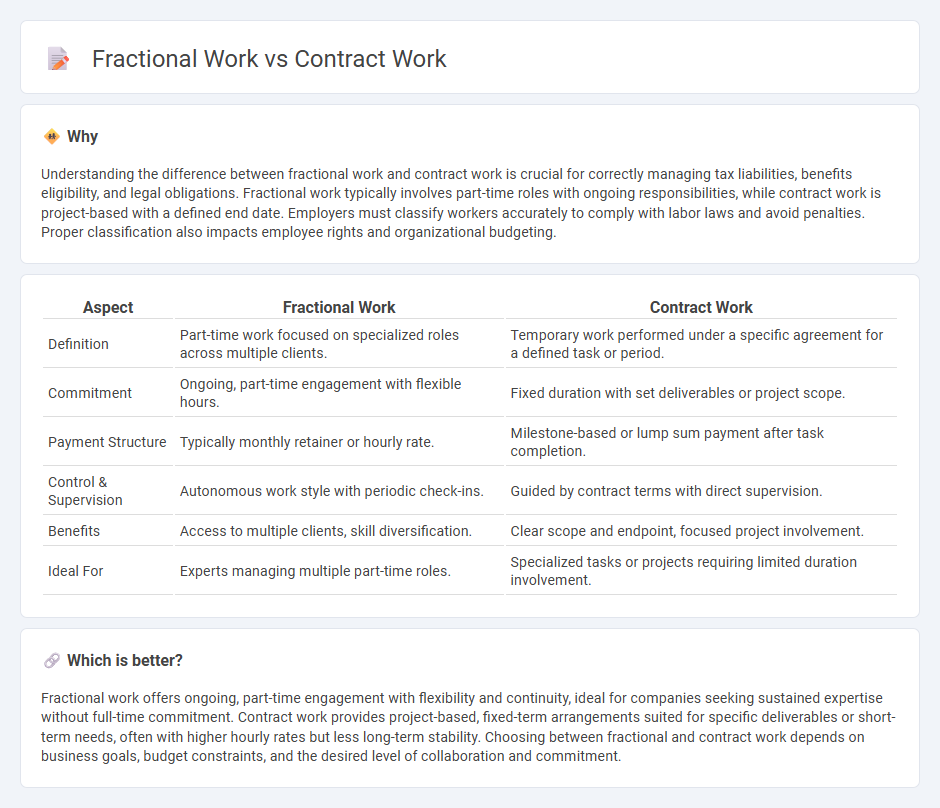
Fractional work enables professionals to contribute their expertise to multiple companies on a part-time basis, offering flexibility and diverse project engagement. Contract work involves a defined agreement where individuals deliver specific services or projects within a set timeframe, often with clear deliverables and temporary commitment. Explore the distinctions between fractional and contract work to determine the best fit for your career or business needs.
Why it is important
Understanding the difference between fractional work and contract work is crucial for correctly managing tax liabilities, benefits eligibility, and legal obligations. Fractional work typically involves part-time roles with ongoing responsibilities, while contract work is project-based with a defined end date. Employers must classify workers accurately to comply with labor laws and avoid penalties. Proper classification also impacts employee rights and organizational budgeting.
Comparison Table
| Aspect | Fractional Work | Contract Work |
|---|---|---|
| Definition | Part-time work focused on specialized roles across multiple clients. | Temporary work performed under a specific agreement for a defined task or period. |
| Commitment | Ongoing, part-time engagement with flexible hours. | Fixed duration with set deliverables or project scope. |
| Payment Structure | Typically monthly retainer or hourly rate. | Milestone-based or lump sum payment after task completion. |
| Control & Supervision | Autonomous work style with periodic check-ins. | Guided by contract terms with direct supervision. |
| Benefits | Access to multiple clients, skill diversification. | Clear scope and endpoint, focused project involvement. |
| Ideal For | Experts managing multiple part-time roles. | Specialized tasks or projects requiring limited duration involvement. |
Which is better?
Fractional work offers ongoing, part-time engagement with flexibility and continuity, ideal for companies seeking sustained expertise without full-time commitment. Contract work provides project-based, fixed-term arrangements suited for specific deliverables or short-term needs, often with higher hourly rates but less long-term stability. Choosing between fractional and contract work depends on business goals, budget constraints, and the desired level of collaboration and commitment.
Connection
Fractional work and contract work both involve flexible employment arrangements where professionals perform specific tasks or projects for an organization without full-time commitment. Fractional work typically refers to sharing expertise across multiple companies simultaneously, while contract work is often defined by a fixed-term agreement for a particular job or deliverable. Both models offer scalability and cost efficiency, making them integral to modern workforce strategies that prioritize agility and specialized skill sets.
Key Terms
Duration
Contract work typically involves a fixed-term agreement with a defined start and end date, often project-based and ranging from a few weeks to several months. Fractional work refers to ongoing engagements where professionals contribute part-time over a longer duration, offering consistent strategic support without full-time commitment. Explore the key differences in duration and commitment between contract and fractional work to determine the best fit for your business needs.
Scope of Responsibilities
Contract work typically involves clearly defined tasks with specific deliverables and limited scope, often project-based and time-bound. Fractional work entails broader responsibilities, acting as an integral part of the team with ongoing strategic input and decision-making authority across multiple areas. Explore the differences in scope of responsibilities further to understand which model suits your business needs best.
Employment Relationship
Contract work involves a temporary agreement where the worker performs specific tasks for a defined period without establishing an employment relationship, while fractional work typically entails a part-time engagement with ongoing responsibilities that may resemble an employment status. Employment relationship in contract work is generally absent, as contractors maintain independence and provide services to multiple clients, whereas fractional workers often integrate more closely with the company's operations and culture. Explore further to understand the legal implications and best practices for managing both contract and fractional work arrangements.
Source and External Links
What Is a Contract Job, and How Does It Work in 2025? - Upwork - A contract job hires a worker for a specific task over a fixed period and fee, offering flexibility and defined project work beneficial to both businesses and professionals.
Contractor Opportunities | The Cigna Group Careers - Contract roles provide temporary assignments with potential for full-time transition, often offering flexible work arrangements and benefits through vendor employers.
Contract Jobs - Remote Work From Home & Online - FlexJobs - Numerous remote and flexible contract jobs are available across varying experience levels, including freelance, part-time, and full-time options in many industries.
 dowidth.com
dowidth.com